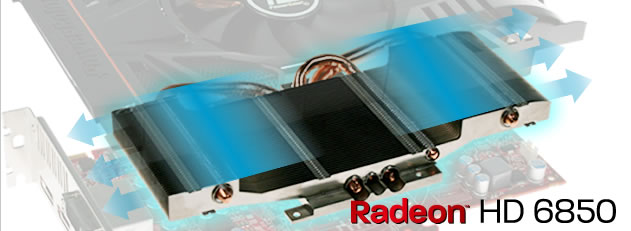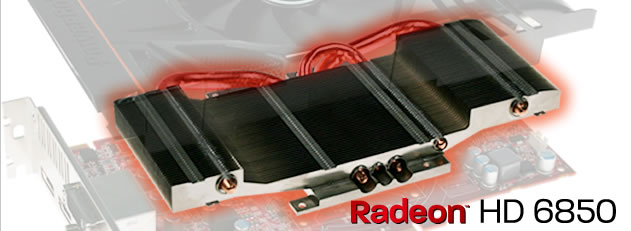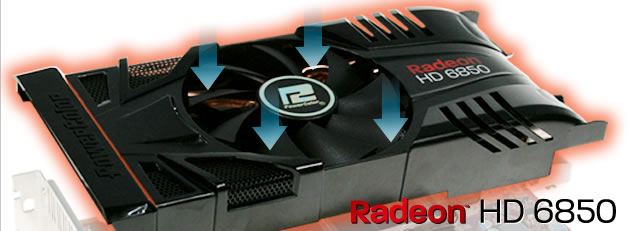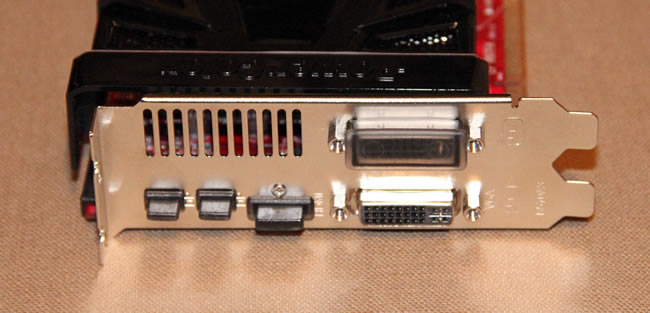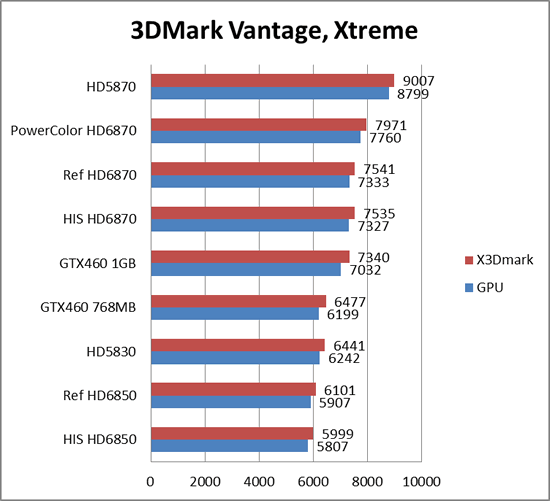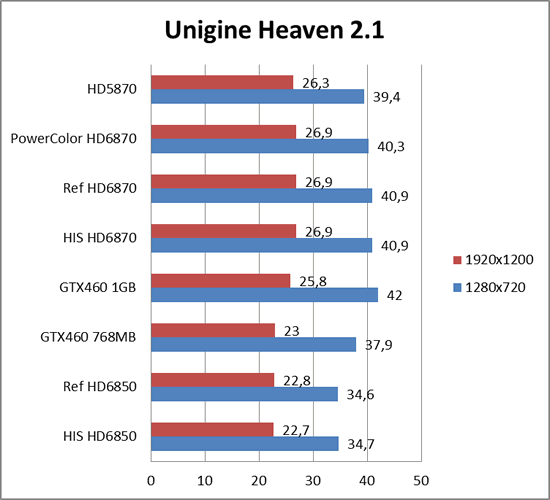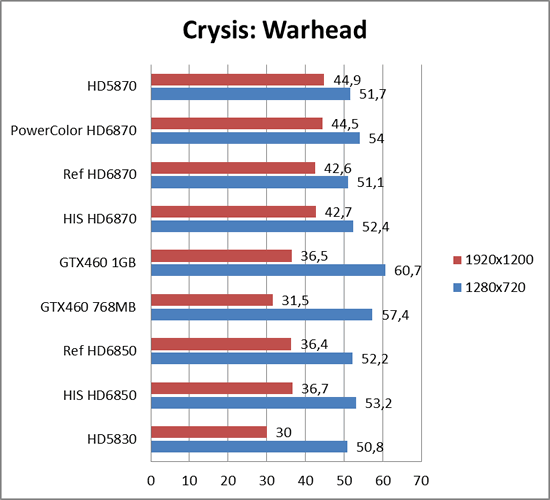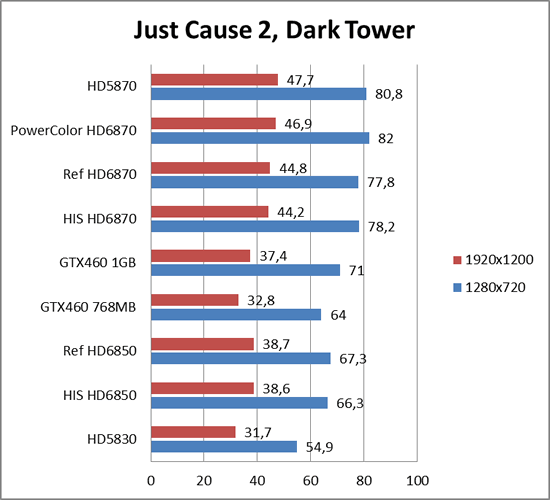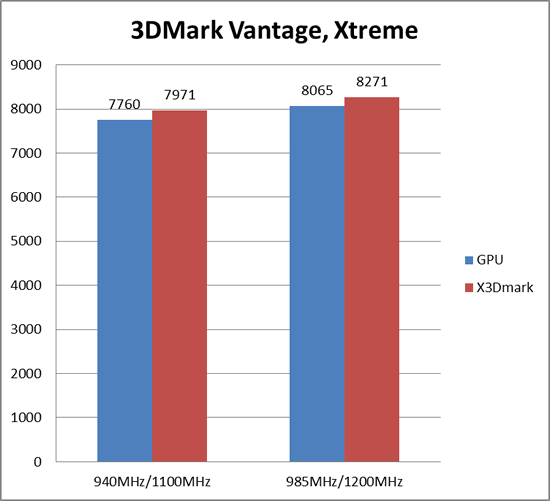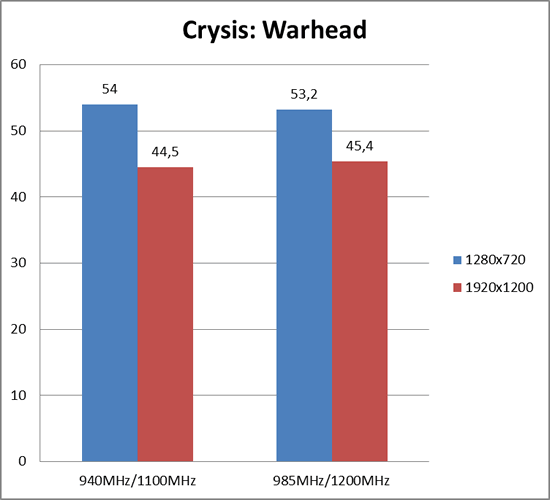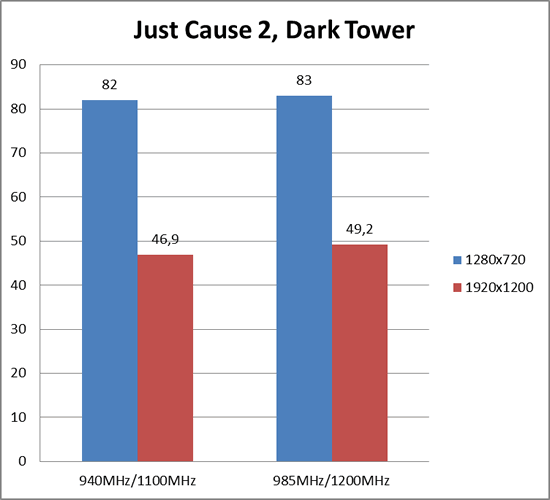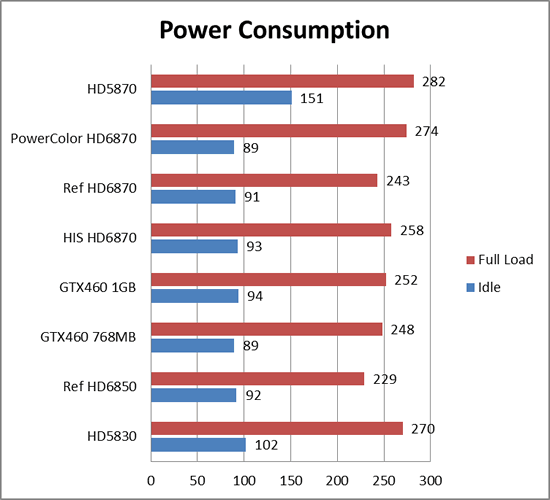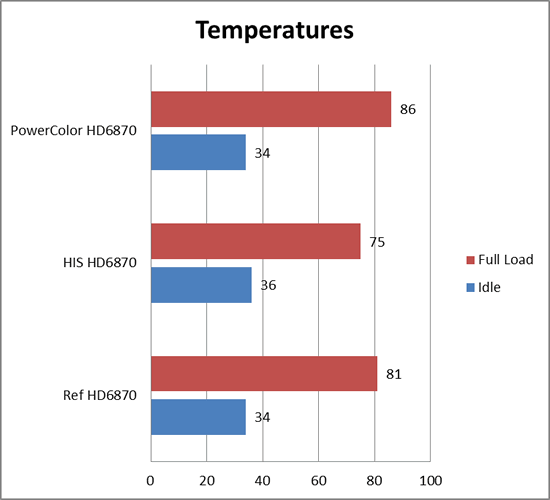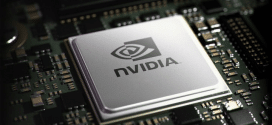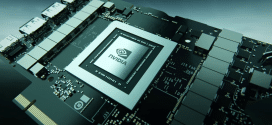The PowerColor PCS+ HD6870 1GB GDDR5 is a factory overclocked HD6870-card with a interesting cooler. How does it compare to the regular HD6870 and the GTX460? Read the review to find out.
INTRODUCTION
With the release of the HD6950 and HD6970, it is easy to forget the mid-range GPUs that AMD released earlier in October 2010: the HD6850 and the HD6870. However, most buyers don’t want the fastest or the best, so these two GPUs target a very lucrative sector of the market where a good price versus performance ratio is important. Today we are taking a look at the PowerColor PCS+ HD6870 1GB GDDR5 (CALL OF DUTY EDITION). Behind this rather long name is a factory overclocked HD6870 GPU with a custom cooler that not only claims it can cool the card 15% better than a stock cooler, but also stay quiet doing it. The version we are reviewing also comes with Call of Duty: Modern Warfare 2.
FEATURES
Read our article about the HD6870 to get an overview of the general GPU features.
The main feature is the custom cooler that the card uses, which in turn allows PowerColor tofactory overclock the card from 900 MHz to 940 MHz.
The cooler is built up in three layers (the images are about the PCS+ HD6850 but are the same for the PCS+ HD6870):
At the bottom are 44 extremely thin cooling fins that provide the great dissipation surface area.
Next we have a extra large heat pipe design – 8mm x 2 + 6mm x 1 pure copper heat pipes that offer better cooling performance than a normal heat pipe.
Last but not least, everything is cooled by a 92mm low noise impeller cooling fan.
SPECIFICATIONS
| Specifications | ASUS EAH6850 DirectCU |
|---|---|
| Graphics Engine | PowerColor PCS+ HD6870 |
| Bus Standard |
PCI Express 2.1 |
| Video Memory |
1GB GDDR5 |
| Engine Clock |
940MHz |
| Memory Clock |
4400 MHz (1100 MHz DDR5) |
| Memory Interface | 256-bit |
| RAMDAC |
400MHz |
| DVI Max. Resolution |
2560 x 1600 |
| D-Sub Max. Resolution | 2048 x 1536 |
| D-Sub Output |
1 (via DVI to D-Sub adaptor) |
| DVI Output |
2 (1 x DVI-I, 1 x DVI-D) |
| HDMI Output |
1 |
| DisplayPort | 1 miniDP |
| HDCP Support |
Yes |
| Adaptors Bundled |
1x DVI to D-Sub adaptor 1x Crossfire cable 1x miniDP to DisplayPort adaptor 1x Power cable |
| Software Bundled |
Driver, coupon for Call of Duty |
| Dimensions |
241.3mmx111.2mmx38mm |
We were pleased to see that PowerColor includes a mini-DisplayPort to DisplayPort adapter. This was missing on the HIS HD6870.
CLOSER LOOK
The card comes in a nice box that vividly depicts all the cool features of the card. More importantly, the box does a good job protecting the card during transit.
The special cooler is the most prominent feature of the card and looks quite cool. Under the plastic shell we can spot the copper heat-pipes.
As expected, we get two DVI-ports (one DVI-I and one DVI-D), an HDMI-port and two mini-DisplayPorts.
The card needs power from two 6-pin PCI-Express power connectors. The plastic cover sits very close to the connectors and we had to bend it away a bit to get the cables to lock into the connectors.
PowerColor includes the usual DVI to VGA-adapter and CrossfireX-bridge. They also include a mini-DisplayPort to DisplayPort adapter which adds value as most monitors still seem to use regular DisplayPort. It is nice to get the Call of Duty: Modern Warfare 2 game, though we would have preferred Black Ops.
PERFORMANCE – SETUP
We tested the card on the following system:
- AMD Phenom II X6 1090T @ 3.2 GHz
- Noctua NH-C12 Cooler
- 4 GB OCZ Black Edition DDR3 @ 1600 MHz
- ASUS Crosshair IV Formula
- 300 GB WD Raptor (System Disk)
- 1 TB Samsung F2 (Storage Disk)
- Thermaltake 1200W PSU
- Dell 24” monitor with a maximum resolution of 1920×1200
- Windows 7 Pro 64-bit
- Catalyst 10.10
The cards tested were:
- HIS HD5830 Turbo
- Reference AMD HD5870
- Reference AMD HD6850
- Reference AMD HD6870
- HIS HD6870
- Zotac GTX460 768 MB
- Gigabyte GTX460 1 GB OC (715 Mhz)
- PowerColor PCS+ HD6870
- HIS HD6850
3DMARK VANTAGE
Though 3DMark 11 now is available, 3DMark Vantage still is a good benchmark for DX10.
Setting: Xtreme
The PowerColor PCS+ HD6870 scores about 6% better than a reference HD6870.
UNIGINE HEAVEN 2.1
Unigine Heaven is a benchmark program based on Unigine Corp’s latest engine, Unigine. The engine features DirectX 11, hardware tessellation, DirectCompute, and Shader Model 5.0. All of these new technologies, combined with the ability to run each card through the same exact test, means that this benchmark is an essential component of our arsenal.
Settings used:
Shaders: high
Tessellation: normal
Anti-aliasing: 4x
Anisotropy: 16x.
Surprisingly the extra horsepower of the PowerColor PCS+ HD6870’s factory overclock d actually results in any increase in the score from Unigine. Other than that it performs great and places itself at the top together with the other HD6870 cards.
CRYSIS: WARHEAD
Crysis Warhead is the much anticipated standalone expansion pack to Crysis, featuring an updated CryENGINE™ 2 with better optimization. It was one of the most anticipated titles of 2008.
Settings: “Gamer”, DX10, 4xAA
While the Nvidia cards performed best at lower resolutions, the HD6870 performed very well at 1900×1200. In fact, of the cards tested, only the HD5870 outperformed the PowerColor PCS+ HD6870, which in turn was just ahead of the other non-overclocked HD6870 cards.
JUST CAUSE 2
Settings: Text Det: High , Shadow Qual: High , 4xAA , 16xAF , Water: Very High , Objects: Very High , Decals: OnSoft Particles: On , V-Sync: Off , Hig-res shadows: On , SSAO: High , Point Light Spec: On
Just Cause 2 is yet another game where AMD GPUs run very well. The PowerColor PCS+ HD6870 just missed the top spot, but the difference between it and the HD5870 is minuscule.
OVERCLOCKING
Even though the card is factory overclocked, we of course want to see if we can get a bit more out of it. We used the built-in overdrive feature in Catalyst and let it find a stable overclock. We then ran both Furmark and 3DMark Vantage several times to verify that the overclock was stable.
We were hoping to reach 1 GHz on the GPU but had to dial back to 985 MHz to get an overclock that was stable in all applications. 1 GHz actually worked in 3DMark Vantage but the card hung in Crysis: Warhead. We managed to increase the memory speed to 1200 MHz from 1100 MHz.
Overclocking the card gives us up to 5% more performance. Considering the card already performs well at the highest resolution in most games, we don’t see a huge need to overclock the card further, but it is nice to know there is a bit more headroom.
POWER CONSUMPTION
We measured the power consumption at the wall. This includes the whole system (except the monitor). Idle was measured at the Windows desktop while Full Load was measured when running Furmark at 1920×1200 resolution.
While the PowerColor HD6870 drew just as much power as the other cards when idling; it drew about 25W more power when running at full speed, which may be caused by the factory overclocking.
TEMPERATURES ANd NOISE
As PowerColor promises a cooler experience with this card compared to the stock cooler, we compared it to both a reference HD6870 and the HIS HD6870 which also uses the stock fan. We ran all cards with FurMark for 30 minutes and measured the maximum temperature recorded during the run.
This surprised us a lot. We reran the test several times just to confirm the validity of our results. Instead of offering lower temperatures, the PowerColor PCS+ HD6870 actually performed hotter than the other cards. What is interesting is that while the reference HD6870 and the HIS HD6870 only spin the fan up to around 34% of maximum speed (21% at idle) the fan on the PowerColor card spins up to a whopping 69% of max speed (also 21% at idle).
While the fan doesnt seem to cool as well as PowerColor claims, it does run much more quietly. We measured the noise level at 50 cm from the back of the system with a noise meter. The result was interesting. The PowerColor fan spins up to a much faster speed, cools less well, but is much quieter than the HIS HD6870. The sound is much softer and not especially annoying.
CONCLUSION
We like the PowerColor PCS+ HD6870 1GB GDDR5. The GPU itself is nice and is full of cool features that we like (DX11, Eyefinity, support for multiple connections, HD-sound support). The cards using the HD6870 GPU are priced around $230-250, which is a good price compared to both the GTX460 1 GB (which is cheaper at around $180 but much slower) and the GTX470 (which has the same performance level but costs around $250 and up).
We liked that this card is factory overclocked, as we know most users do not want to mess with overclocking themselves, even if AMD simplifies it with OverDrive; the fact that there is even more headroom is a nice bonus. However, we were dissatisfied by the small performance increase over a regular HD6870. The card can perform better than a stock card, but users should not expect it to bring gaming to a new level just because of the extra MHz.
We were disappointed with the cooling, as this is one of the advertised features of the card. We are not sure if we got a faulty sample, but the card runs notably hotter than our HIS HD6870 which uses the stock cooler. However, though the fan spun up more compared to the HIS HD6870, this card still was much quieter. The apparent contradiction is puzzling to us: a higher fan speed should cool the card better and create more noise, yet the opposite is true in both cases. However, we accept the results as they are.
The HIS HD6870 also could not handle the same clockspeed as the PowerColor card, 940 MHz/1100MHz not to mention 985MHz/1200MHz, so in the end it might not matter if the card runs hotter as it clearly is able to handle it.
The main negative, though, is the price. At around $275, is an quite expensive card, costing $25 to $45 higher than a regular HD6870. It also costs a bit more than a GTX470, which should perform on a similar level. What users really get for that extra cash is a relatively modern game, slightly better performance over a regular HD6870 and a cooler that does not necessarily cool the card better, but at least lets it run quieter than the regular HD6870-cards.
| PowerColor PCS+ HD6870 1GB GDDR5 (Call of Duty edition) | ||||||||||||||||||
Summary: The PowerColor PCS+ HD6870 is a great card that offers good performance for a relatively good price. It is a bit more expensive than a regular HD6870, but that is made up for by the factory overclocking, the bundle game and the quieter operation of the fan. It earns the Bjorn3D Bronze Bear Award. |
 Bjorn3D.com Bjorn3d.com – Satisfying Your Daily Tech Cravings Since 1996
Bjorn3D.com Bjorn3d.com – Satisfying Your Daily Tech Cravings Since 1996


